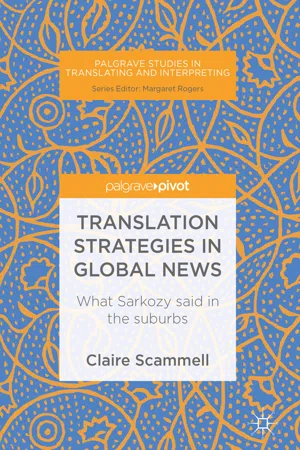In November 2005, as French interior minister and presidential candidate, Nicolas Sarkozy became the focus of international media attention. Riots in France’s banlieues – poor, high-immigration residential areas on the peripheries of major cities – were being reported to have been sparked by controversial language used by the former French president on a visit to a cité (high-rise housing development) in Paris’ banlieue. What Sarkozy said became a news story. But while French journalists were bound by ideals of accuracy and objectivity to report precisely what Sarkozy had said, the translation process made this an impossibility for journalists reporting in other languages. The words chosen to translate key terms vary, but a typical translation in the British press quotes Sarkozy as promising to wash out the ‘scum’ [racaille] with a ‘power hose’ [Kärcher]. In France, Sarkozy’s use of the word ‘racaille’ caused particular controversy. The different translations used in the British press (which include ‘rabble’, ‘riff-raff’ and ‘yobs’ in addition to ‘scum’) reflect that there is no clear equivalent in English. In addition to the words used by Sarkozy , representations of the speech event were shaped by the terms used to translate the French culture-specific reality Sarkozy was speaking in and about – a cité in the banlieue of Paris. Translations tend to situate the speech event in the ‘suburbs’ of Paris. In British English, ‘suburbs’ are typically affluent and desirable residential areas on the outskirts of cities; translating banlieue to ‘suburbs’ therefore has the effect of communicating a distinctly different reality to a British audience.
The translations of banlieue to ‘suburb’, and ‘racaille’ to ‘rabble’, ‘yobs’, ‘rif-raff’ or ‘scum’, in reports of what Sarkozy said in the British press , reflect a norm for ‘domesticating’ translation strategies in the news (Bielsa and Bassnett 2009; Holland 2013; Schäffner 2005). A ‘domesticating’ translation strategy (Venuti 2008) is one which uses only terms the reader will immediately recognise and understand. As such, a ‘domesticating’ approach to translation is in accordance with the newswriting principle that readers should be able to quickly understand the reporting, without needing to look beyond the information provided (Cotter 2010, p. 119). Foreignising strategies (Venuti 2008), which, by contrast, involve retaining something of the foreignness of the source text (be that foreign language, concepts or syntax, for example), are considered an unviable alternative for news translation on the basis of the need to conform to readers’ needs and expectations (Bassnett 2005; Bielsa and Bassnett 2009; Holland 2013; Schäffner 2005).
In the flow of news information across linguistic boundaries, made possible by translation, there is the opportunity for readers to come into contact with and thus acquire new knowledge and understanding of foreign realities. As Schäffner (2005, p. 165) remarks: “[t]ranslation involves crossing linguistic, geographical and political spaces. The resulting encounters with the ‘other’ should lead to new modes of thinking, feeling, and experiencing the world”. Schäffner’s statement echoes the cosmopolitan ideal which Bielsa (2010, 2014, 2016) advocates in the context of news translation. In Bielsa’s work, an argument is made in favour of foreignising news translation in terms of its cosmopolitan potential. She underlines that translation can be a site of cosmopolitan openness in global news, but only through the use of strategies that expose rather than obscure cultural and linguistic difference. This book investigates the scope for a foreignised approach to translation in the news as an ethical alternative to the current domestication norm. The ethical potential of a foreignised approach is found in the key role news translation plays as a tool of intercultural communication and in the implications of the translation process for the accuracy of quotation.
The term foreignised, used to describe the approach developed in the investigation, is a deliberate variation on Venuti’s (2008) ‘foreignisation’, the opposing strategy to ‘domestication’, to reflect that it is only foreignising in certain defined respects. In other words, and as presented in the following chapters, the foreignised approach is only intended to be foreignising to a degree. The book takes Venuti’s arguments surrounding the ethical value of foreignising strategies in literary translations (Venuti 1998, 2008), and reformulates them in a news translation context. It examines individual translations in English-language news reporting in order to determine what forms of foreignisation could represent practical translation strategies for journalists. The study is particularly interested in quotation and culture-specific concepts as two key sites of translation in the new...
